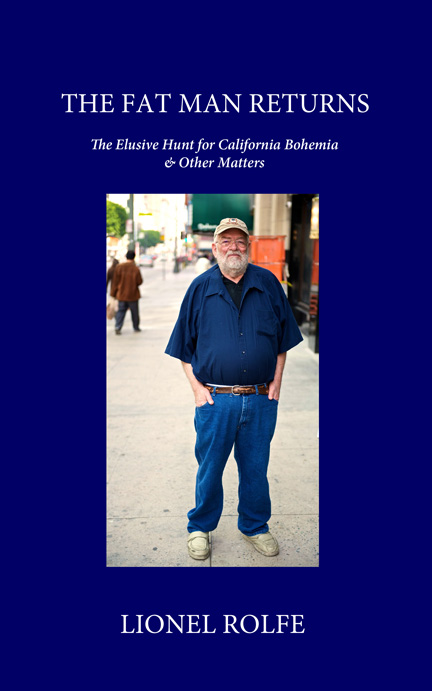The Fat Man Returns; The Elusive Hunt for California Bohemia and Other Matters
Review by Mary Reinholz
Peripatetic author and journalist Lionel Rolfe has slimmed down considerably judging from the cover of this slender 155-page collection of personal essays first written for the Pasadena Weekly and the Huffington Post and compiled nearly two decades after the publication of his 1998 volume, “Fat Man on the Left: Four Decades in the Underground.” In these short chapters, Rolfe, now in his 70s, makes it clear that he still maintains many of his hefty lefty beliefs. He’s all for unions to help working folks deal with the bosses despite his memories of unsavory mob figures in the background.
You can hardly blame him for advocating for collective bargaining. Rolfe also recalls a scoundrel time in his life when members of the John Birch Society discovered his past as a “teenage Commie journalist” and got him fired from the Pismo Beach Times.
But that was a long time ago. Rolfe, member of a California musical family (his uncle was the world famous violinist Yehudi Menuhin) and veteran newspaperman (he has also worked for the San Francisco Chronicle and the Los Angeles Times), mainly emerges in this book as a wandering Jew occasionally given to melancholy musings on the vulnerable state of the planet, the breakup of his third marriage and his own mortality. He travels abroad to exotic places like Australia but still finds his native Los Angeles a sprawling secular paradise, a glitzy heaven on earth where the arts flourish and can become akin to a spiritual experience. For example, in his chapter on Victor Vener, the conductor and “driving force” behind the California Philharmonic, Rolfe notes that music is “not just entertainment–it is about the universe and all of its mysteries.”
Yes, for this benevolent and bearded West Coast booster (who looks a bit like Papa Hemingway about to embark on a safari), La La Land is not an amorphous blur of suburbs surrounded by freeways and looking for a center, but rather a sprawling series of hot spots containing California bohemian culture — particularly in the communities of Echo Park and Venice (“An Elusive Utopia by the Sea”). If L.A. seems to some like a plastic wasteland, Rolfe summons up natural beauty to be found by gazing at real stars in the Griffith Park Observatory. He laments the disappearing Sierra glaciers, but enthusiastically recounts how the smoggy city of angels once nurtured literary titans like Mark Twain, Jack London and Henry Miller along with Rolfe’s more contemporary heroes like the late screenwriter Dalton Trumbo, blacklisted during the 1950s Red Scare “when American fought its own form of fascism.”
“Dalton Trumbo might have been an imperfect hero, but he truly was a hero,” writes Rolfe, adding. “I wish we had writers like Trumbo these days. I doubt they are there.”
Oddly, Rolfe writes little about California women authors: Famed writer Joan Didion, legendary native daughter now living in New York is not even mentioned in “The Fat Man Returns.” But Rolfe gives ample attention to yoga teacher Indra Devi, South Los Angeles born blues singer Sonji Kimmons and actress Susan Anspach whom he met for the first time in 2012 at an Echo Park party filled with the boho hipsters types he seems to revere. Rolfe reports that he maintained an “essentially platonic affair” with Anspach for more than a year. He goes into little detail about this affair, but spells out more physical contact with a Latina woman he calls Eve shortly after his wife left him.
While Rolfe can lapse into sentimentality and self-pity, he is a strong writer who can tell an absorbing tale. He also casts a cold eye on the killing of 41-year-old Ted Derby, an animal trainer who provided exotic beasts for use in television commercials and movies, in a place called Sand Canyon on April 12,1976. The perpetrator, Jack Coyne, 63 at the time, shot Derby twice but was never prosecuted for what Rolfe repeatedly describes as a cold blooded murder. He quotes Derby’s late ex-wife Pat Derby, extensively in his last chapter of “Fat Man.” which focuses on animal intelligence. Both seem to agree that animals are probably a lot smarter creatures than humans on this endangered earth. #”

Comments
Leave a Reply
You must be logged in to post a comment.



